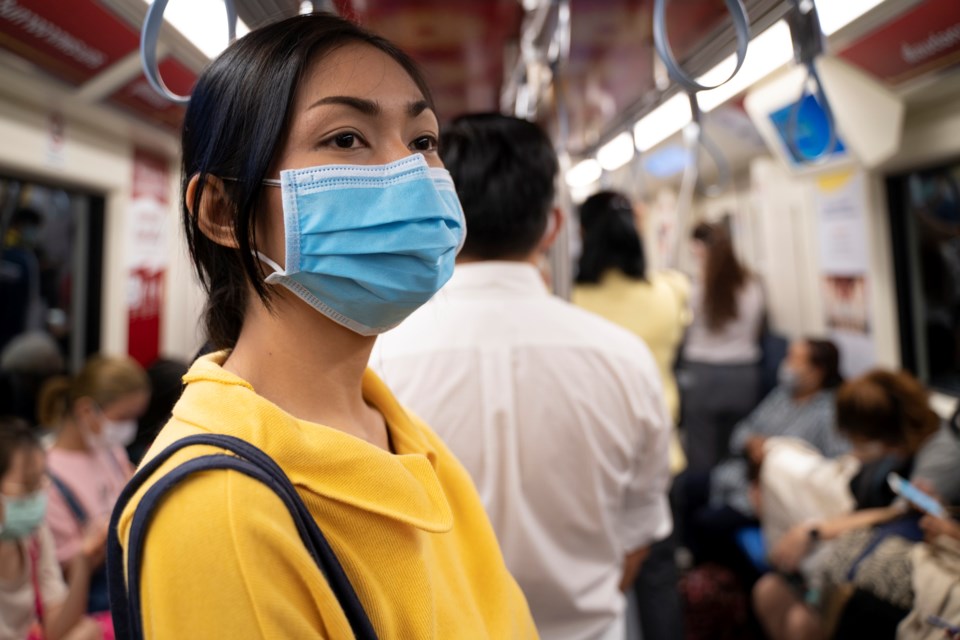Strain continues in B.C. hospitals, with the province's fourth wave of the COVID-19 pandemic sloshing ever higher.
The number of those in B.C. hospitals' intensive care units (ICUs) with COVID-19 is once again higher than at any time in the past four months, with 157 people fighting for their lives in those wards. You have to go back to May 5 to find more COVID-19 patients (161) in B.C. ICUs.
The total number of those patients includes people who have had to be moved from the Northern Health region, to beds in the Lower Mainland, and Vancouver Island, because of a scarcity of beds in the province's North.
The number of COVID-19 patients in any hospital ward in B.C. fell by eight overnight, to 324.
Countless serious COVID-19 infections are also now present in the 23 outbreaks at B.C. seniors' homes, and other healthcare facilities. One new outbreak in a seniors' home identified in the past day was at Sunset Manor in Chilliwack.
Another 10 people died from COVID-19 in the past day in B.C., raising the province's pandemic death toll to 1,910.
Health officials continue to detect high numbers of new infections. In the past 24 hours, 759 new individuals were confirmed to be infected with the SARS-CoV-2 virus, which causes COVID-19. While this is much higher number than the 525 infections detected yesterday, exactly three times more tests were conducted in the past 24 hours (15,846), compared with the previous day (5,282).
The vast majority of the 5,458 people actively diagnosed with COVID-19 have been told to self isolate.
More than 95.7%, or 173,215 of the 180,937 people ever infected with COVID-19 in B.C., are deemed by the province to have recovered because they have gone 10 days after first feeling symptoms, and are therefore not thought to be infectious.
New vaccinations have slowed, as the vast majority of British Columbians are already fully vaccinated.
Health officials provided 14,180 doses of vaccine to British Columbians in the past day, with 7,057 of those being to unvaccinated individuals, and 7,123 going to those needing second doses. No data was available for any third doses, which have started to be administered to those who are considered extremely vulnerable, and immunocompromised.
Of the 4,038,966 B.C. residents who have received one dose of vaccine since mid-December, 2020, more than 91.4%, or 3,692,922, are fully vaccinated, with two doses.
The B.C. government estimated in July that the province's total population is 5,147,712, so Glacier Media's calculation is that more than 78.4% of B.C.'s total population has had at least one dose of vaccine, and 71.7% of the province's total population has had two doses.
The province estimates that 87.1% of eligible British Columbians, older than 12 years, have had at least one dose of vaccine, with 79.7% of that population considered fully vaccinated with two doses.
Vaccination is important because it limits the likelihood of infection, an when infections do happen, they tend to lead to milder illness.
Government data from yesterday show that, after factoring for age, people not vaccinated against COVID-19 are 33.1 times more likely to be hospitalized than those fully vaccinated.
Of the 353 hospitalizations in the two weeks ended September 19, there were:
• 279 not vaccinated (79%);
• 20 partially vaccinated (5.7%); and
• 54 fully vaccinated (15.3%).
The 4,367 cases in the week ended September 19 included:
• 2,982 (68.3%) unvaccinated;
• 340 (7.8%) partially vaccinated; and
• 1,045 (23.9%) fully vaccinated.
For every 100,000 people in B.C. who are unvaccinated, government data show that 290.3 were infected with COVID-19 between September 13 and 19. For every 100,000 people in B.C. who have had one shot of vaccine, there were 87.2 new cases, and for every 100,000 fully vaccinated British Columbians, there were only 26.3 new cases.
The Northern Health region and Interior Health region have been the hot spots for infection per capita for weeks, and those trends continued today.
Glacier Media's math shows the number of new infections per health region, for each 10,000 residents (with total new cases in brackets) was:
• 1.2 in Fraser Health (214);
• 0.8 in Vancouver Coastal Health (101);
• 3.1 in Interior Health (233);
• 2.6 in Northern Health (79); and
• 0.7 in Island Health (61).
There were three new infections in people who normally do not reside in B.C.
The result by health region for the 5,458 people fighting active infections for each 10,000 residents (with total new cases in brackets) was:
• 9.6 in Fraser Health (1,734);
• 7 in Vancouver Coastal Health (877);
• 16.5 in Interior Health (1,223);
• 31.4 in Northern Health (943); and
• 7.5 in Island Health (636).
The active case counts include 45 people who normally live outside B.C.



